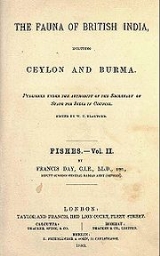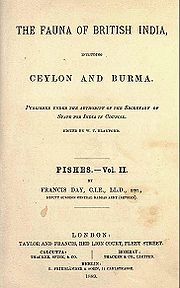
Francis Day
Encyclopedia

Order of the Indian Empire
The Most Eminent Order of the Indian Empire is an order of chivalry founded by Queen Victoria in 1878. The Order includes members of three classes:#Knight Grand Commander #Knight Commander #Companion...
(1829–1889) was Inspector-General of Fisheries in India
India
India , officially the Republic of India , is a country in South Asia. It is the seventh-largest country by geographical area, the second-most populous country with over 1.2 billion people, and the most populous democracy in the world...
(from circa 1871) and Burma and an ichthyologist.
He was born on 2 March 1829 Maresfield, Sussex, UK third son of William and Ann Day. He became the medical officer in the Madras Presidency
Madras Presidency
The Madras Presidency , officially the Presidency of Fort St. George and also known as Madras Province, was an administrative subdivision of British India...
, East India Company services in 1852.
Francis Day was created a Companion of the Order of the Indian Empire
Order of the Indian Empire
The Most Eminent Order of the Indian Empire is an order of chivalry founded by Queen Victoria in 1878. The Order includes members of three classes:#Knight Grand Commander #Knight Commander #Companion...
in 1885. He was decorated with the Order of the Crown of Italy
Order of the Crown of Italy
The Order of the Crown of Italy was founded as a national order in 1868 by King Vittorio Emanuele II, to commemorate the unification of Italy in 1861...
. He retired in 1877.
Day wrote a monograph
Monograph
A monograph is a work of writing upon a single subject, usually by a single author.It is often a scholarly essay or learned treatise, and may be released in the manner of a book or journal article. It is by definition a single document that forms a complete text in itself...
on fishes between 1875–1878 "The Fishes of India" with a supplement in 1888 and two volumes on "Fishes" in The Fauna of British India, Including Ceylon and Burma series in which he described over 1400 species. He also wrote British and Irish Salmonadae, which he illustrated with 9 plates, the colouring of which was done by Miss Florence Woolward. Francis Day was granted an honorary LLD by the University of Edinburgh.
Day also published Fishes of Malabar in 1865.
Although considered an expert on the fishes of India, Albert Günther found many of Day's observations questionable.
Day was an active member, and president of the Cheltenham Natural Sciences Society and presented his papers to them. He was also was an active member of the Cotswold Field Club, where he was vice president.
He died at his residence, Kenilworth House, Cheltenham on 10 July 1889 of cancer of the stomach and was buried at Cheltenham cemetery.
External links
- BHL Digital versions of works by Francis Day
- http://www.amonline.net.au/collections/ichthyology/day.htm
- Day, Francis (1889) The Fauna of British India, Including Ceylon and Burma. Fishes. Volume 1. Online
- Day, Francis (1889) The Fauna of British India, Including Ceylon and Burma. Fishes. Volume 2. Online

